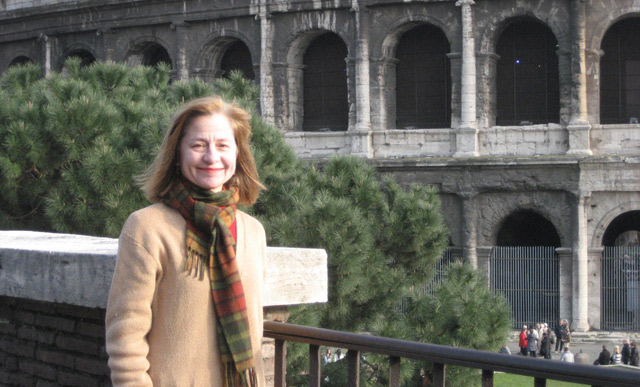5 Questions with . . . Laurie Nussdorfer

For this issue, we queried Laurie Nussdorfer, professor of history, letters and medieval studies and author of Brokers of Public Trust: Notaries in Early Modern Rome (published by The Johns Hopkins University Press in 2009). She supplied her answers in writing, of course.
Q: How did the idea for the book begin?
A: Daniel Rosenberg ’88 wrote a senior honors thesis in the History Department about the historiography of literacy (how historians had interpreted and investigated the ability of people to read in the past). I was one of the readers of this fascinating thesis, and it occurred to me that one could ask similar questions about how people had learned to use writing, even if they couldn’t write themselves, in the past. I work on the city and people of Rome in the period between 1500 and 1700 so naturally I thought of the thousands of volumes of business and personal records that people had left in the Roman archives through their patronage of notaries. I wanted to figure out why people back then went to notaries.
Q: Why do we know so little about notaries?
A: There are two parts to this answer depending on how we understand the word “We.” “We” in the Anglo-American world have a unique legal system basically founded by the kings of England in the 13th century. On the continent of Europe, Scotland, and in Latin America an older system of jurisprudence is in use, which is more directly influenced by ancient Roman law and by the jurists who taught law in the medieval universities than our system is. The “Roman law” tradition gives greater weight to the evidence of documents than the Anglo-American legal system so notaries play a much more important role in that system than they do in ours. One answer to the question, therefore, is that “we” don’t know about notaries because they are not so crucial in our legal particular culture. However, even “we” historians who study these documents don’t know much about notaries precisely because to be authoritative what the notary writes must seem impersonal and objective. Notaries have, and had, every interest in keeping their personal information out of the documents they write for their clients, with the exception of their name and the name of the public power that authorizes them. So, although they have left an enormously rich documentary legacy, they have put their customers’ in the forefront of those documents and kept themselves in the background.
Q: What is the main thing that people don’t realize about notaries between the 14th and 18th centuries?
A: From the point of view of historians, art historians, and music historians, what we have not appreciated is the extent to which notarial documents competed with other types of evidence and, therefore, what particular motivations lay behind the existence of each of these surviving contracts. They were not “neutral” snapshots of social and economic practices. Clients had to pay for them and they did so because they imagined that they might need them in future litigation.
Q: What documents would need to be notarized many centuries ago that today would not?
A: The full answer to this question takes us back to the major distinction between the systems of law that operate in the world today, and have since the Middle Ages. In Anglo-American law very little ever had to be notarized. On the continent, a notarial document was given more credibility by the legislation of local, and eventually national, governments. You didn’t have to go to a notary, but, if you wanted your will or your marriage contract with the all-important dowry to be protected, you would choose to have a notary draw it up and keep it. This is still true for wills, real estate transactions, and pre-nuptial agreements. However, an example of the kind of notarial document that we wouldn’t expect to find today is one that I read about recently in the Roman criminal records of 1632: a priest who had been attacked by a hot-headed architect sent his hat, which had been slashed open by the architect’s sword, to the nearby notary so that a description of the hat could be recorded for posterity and as evidence in the court case the priest planned to bring.
Q: Whom do we have to thank for preserving old notarial records and why?
A: We have Pope Sixtus V (1585-1590) to thank, and more generally the popes who reigned as rulers, as well as bishops, of Rome between 1550 and 1650. Sixtus V wanted to increase the financial resources of the Papal States and he sold everything he could get his hands on in order to do that. In 1586 he informed the city notaries of Rome that the offices that they had previously exercised for free would now cost 500 scudi and limited the number of city (Capitoline) notaries to 30. Henceforth, notaries had to buy the right to be a Capitoline notary. The carrot in the deal was that they could also sell those offices and keep the proceeds. But in order to have an attractive commodity to sell they had to take good care of the writings for which they had been paid by their clients. Only a small proportion of notarial records from the period 1350 to 1580 survive, but for the next three centuries the series of business acts is almost 100 percent complete.

